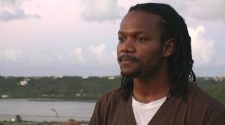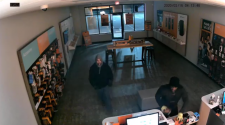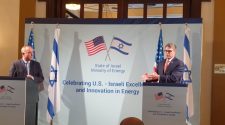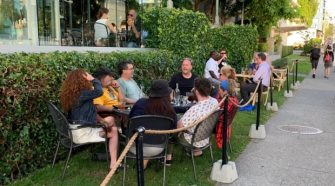●Francis later will hold an interfaith event in the ancient city of Ur, said to be the birthplace of Abraham.
●The pope says the interreligious meeting will aim to show “our conviction that religion must serve the cause of peace and unity among all God’s children.”
UR, Iraq — Pope Francis met Saturday with one of the Muslim world’s leading authorities, the reclusive Grand Ayatollah Ali Sistani, in an effort to improve ties among religions that have spent centuries spilling one another’s blood.
The Saturday meeting between the pope and the ayatollah figures to be the centerpiece of Francis’s four-day trip in Iraq, given Sistani’s influence in Shiite Islam. He is the preeminent figure for Shiites in Iraq and many across the Middle East — and he rarely opens his door to world leaders.
The private meeting, which lasted 50 minutes, slightly longer than planned, took place at Sistani’s modest residence, in Najaf, the holiest city for Shiites in Iraq. It occurred with no media present, and afterward the Vatican said in a statement that the conversation had “underlined the importance of collaboration.”
Iraqi television showed a line of SUVs in Sistani’s neighborhood and a Mercedes used by the pope parked near his residence. The Vatican called the meeting a “courtesy visit,” and said Francis was first welcomed at the residence by Sistani’s son, Mohammed Rida. A dove, symbolic of peace, was released as Francis arrived.
Sistani’s office put out a statement saying that the ayatollah had wished the pontiff, and followers of the church, “happiness and peace.” According to the statement, Sistani said that spiritual leaders of the “great religions” should make an effort to curb the tragedies of oppression, persecution and violence.
Sistani also “affirmed his interest in Christian citizens living like all Iraqis in security and peace and in full to their constitutional rights.”
The encounter between Francis and Sistani by itself amounts to a symbolic show to their followers about the importance of cooperation.
That message is all the more pressing given the setting in Iraq, a nation riven by seemingly intractable religious clashes. Christians have fled Iraq in droves. Sunnis and Shiites have jostled for power. And ethnic minorities found themselves violently targeted during the reign of the Islamic State, which several years ago controlled some one-third of Iraqi territory.
Some Christians are hoping that, in the wake of the meeting, Sistani could emphasize the importance of reopening the doors to Christians who have fled in recent years.
“I think this meeting will change things in Iraq,” said Iraqi Bishop Basel Yaldo. “We hope the Christians come back after this visit of Pope Francis.”
Sistani, 90, is seen as a moderating figure in Iraq, and over the years his pronouncements have demonstrated his sway. He has mobilized Iraqis to vote. He has brought down a prime minister. He helped turn the tide against ISIS, issuing a fatwa that called on Iraqis to join the fight against the group. That intervention had unexpected consequences, though, as it also allowed Iran-backed groups — involved in the fight — to deepen their power and influence over the country.
Sistani, though born in Iran, opposes the theocratic theories that underpin the Iranian state. Sistani argues that clerics should be more advisory, rather than interwoven into the decision-making of government. Francis’s meeting is not an endorsement of Sistani’s view, but it could give his followers a sense of encouragement.
Francis has made outreach to different faith leaders a central point of his eight-year papacy. Two years ago, visiting Abu Dhabi, Francis met with the grand imam of Egypt’s Al Azhar mosque, Sheikh Ahmad al-Tayeb, signing a peace manifesto — what they described as a “Document on Human Fraternity.” That deal amounted to a peace agreement from the head of the Roman Catholic Church and an influential Sunni figure that called for an end for “hatred, violence, extremism and blind fanaticism” in the name of religion.
The pope on Saturday will also hold an interfaith event in Ur, an ancient city said to be the birthplace of Abraham, the patriarch for Jews, Christians and Muslims. Francis said the event will aim to show “our conviction that religion must serve the cause of peace and unity among all God’s children.”



















